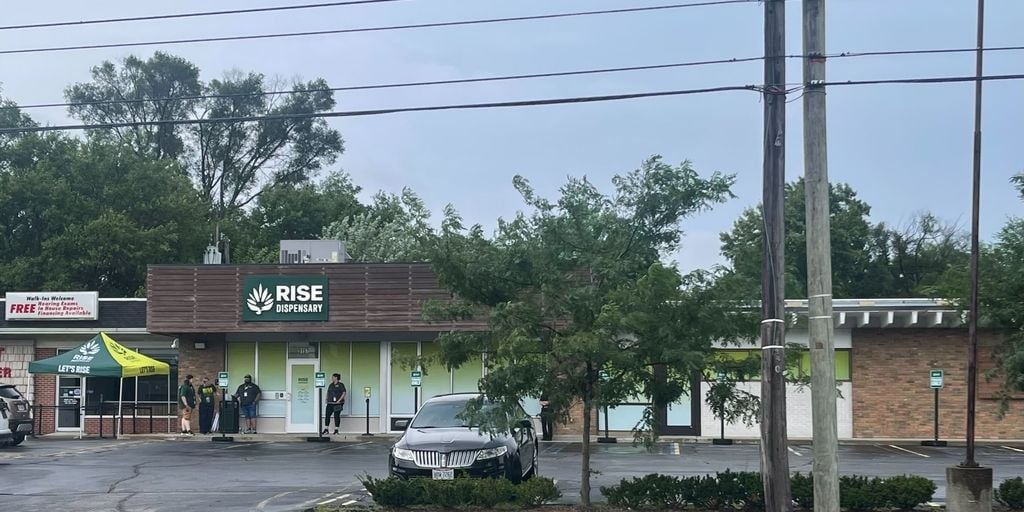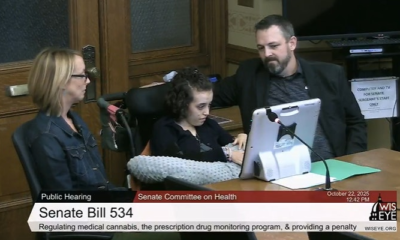Business
Ohio recreational marijuana market off to tepid start, at least in Toledo
Published
1 year agoon

This story was republished with permission from Crain’s Detroit and written by Dustin Walsh.
The rollout of the legal recreational marijuana market in Northwest Ohio appeared to get off to a tepid start Tuesday near the Michigan border
Legal sales to all adults over 21 years old began in the Buckeye State on Tuesday after the state issued licenses to at least 98 previously medical-only dispensaries. But between 9:15 a.m. and noon, Crain’s counted only 49 customers entering Toledo’s only store, Rise Cannabis, approved for recreational sales Tuesday.
Conversely, more than 500 people were lined up at Exclusive Brands Ann Arbor store shortly after opening on Michigan’s first day of adult-use recreational sales on Dec. 1, 2019.
Ben Kovler, chair and CEO of Rise Cannabis’ parent company, Chicago-based multi-state operator Green Thumb Industries Inc. (OTC: GTBIF), called the opening a success, citing the short notice Ohio gave to operators and potential customers about the start of legal recreational sales.
“The state didn’t really tell everyone when it (first day of legal sales) was going to start,” Kovler said. “But it makes day one easier. We weren’t overwhelmed and we’ve had no software problems. We were expecting a slow rollout.”

The state of Ohio quietly began telling operators their recreational licenses were approved late last week, but only made a formal public announcement Monday. The state put strict rules in place for the first day of sales, including banning music, food trucks and any “Grand Opening” marketing materials outside the retail outlets.
The start of Ohio sales clearly was not stopping Ohioans from shopping for cannabis north of the border.
The parking lots of the eight dispensaries clustered across the state line on Laplaisance Road off I-75 in Monroe Township were dominated by Ohio license plates. Of the roughly 139 cars in the dispensaries’ parking lots, 98 held Ohio plates. An additional 16 cars were from other states, including Kentucky, North Carolina, Pennsylvania and Iowa.
Quality Roots near downtown Monroe sold products to 208 customers between opening at 9 a.m. and 2 p.m., CEO Aric Klar told Crain’s. Of those, 29 were from out of state.
Tuesday is typically the industry’s slowest sales day, Klar said, and out-of-state buyers represent 25% of Quality Roots’ sales in Monroe.
Klar said the Ohio market will likely dent Quality Roots sales for the first 30 days, but then pricing pressures will push Ohio customers back into Michigan.
“After that, when the market understands how Ohio’s adult-use market is limited to customers, people will be right back to Michigan,” Klar said. “From price point to variety to brand identity. the state of Ohio has years to catch up to what we have built in Michigan.”
A customer from Ohio leaving Urb Cannabis in Monroe, who asked not to be identified, said he lived about the same distance from there and Rise Cannabis in Toledo, but opted to shop where he usually does and bypass what he expected would be long lines in Ohio. There were no lines at Rise in Toledo.
Another customer at King of Budz, who also declined to reveal his identity, said Michigan’s low prices will keep him crossing the border for some time.
Michigan is cheaper
A half-ounce of Afternoon Delight, a marijuana strain grown by Green Thumb Industries in Toledo, costs $170 at its five Rise stores in Ohio. A half-ounce of Quality Roots branded marijuana flower costs between $45 and $55 at its stores in Michigan, which would represent a discount on Michigan’s typical prices, which averaged $85.88 an ounce as of June 30.
And it’s likely prices will take some time to come down in Ohio as the market rolls out.
The Ohio Department of Cannabis Control received 230 applications for dual medical and recreational licenses and granted 226 provisional licenses for operators in the state. The majority of those provisional licenses were issued to existing medical cannabis dispensaries.
That compares with nearly 1,100 marijuana licenses issued in Michigan. Ohio has nearly 1.8 million more residents.
In June alone, operators in Michigan sold more than $278.84 million worth of recreational and medical marijuana, according to data from the Michigan Cannabis Regulatory Agency. Through June 30, sales have totaled nearly $1.63 billion on pace to sell more than $3.2 billion for the year.
Ohio sales, all medical marijuana, totaled $38.06 million in July, according to data from market analysis firm Headset.
Ohio’s recreational market is also hamstrung by an absence of recreational rules. Until those rules are finalized, operators must continue their medical marijuana rules. Among those rules is a combustible ban, meaning operators can’t sell pre-roll marijuana cigarettes, a popular category among customers, and marketing is more limited.
Even so, Kovler is bullish on the Ohio market.
“We know people go to Michigan to buy cannabis, but we also know Ohioans love Ohio marijuana,” Kovler said. “Our marijuana is grown in Ohio by Ohio people. It supports Ohio jobs. The state will continue to open up and grow significantly and that’s why we’re here.”
Kovler said Green Thumb Industries, which is traded on the OTC Market, a small securities stock exchange in New York with a market cap of $2.3 billion, isn’t as of yet considering entering Michigan’s hypercompetitive market. It has no plans to expand its presence in Toledo, believing its one dispensary is enough to support the city of more than 266,000.

Author: mscannabiz.com
MScannaBIZ for all you Mississippi Cannabis News and Information.
You may like
-


West Virginia Medical Marijuana Revenue Is Supposed To Support Drug Treatment Programs, But Sits Unspent As Officials Worry About Federal Prohibition
-


Frequent Marijuana Use Is Tied To Lower Risk Of Liver Disease From Alcohol, New Study Finds
-


Ohio bill to scale back cannabis legalization passed by House (Newsletter: October 23, 2025)
-


FDA Weighs Petition On ‘Significant Harm’ Of Marijuana Hair Testing Device’s Positive Results From Secondhand Smoke
-


Wisconsin Lawmakers Rally for Medical Cannabis Legalization in Committee Hearing
-


Massachusetts Campaign To Roll Back Marijuana Legalization Law Is ‘On Track’ To Make 2026 Ballot, Spokesperson Says
Business
Nebraska medical cannabis regulations stall in legislative committee
Published
6 months agoon
April 18, 2025

A Nebraska legislative committee voted 5-3 against advancing a bill designed to implement and regulate the state’s medical cannabis program, leaving legislators and advocates searching for alternative paths forward, according to the Nebraska Examiner.
The General Affairs Committee rejected Legislative Bill 677, sponsored by State Sen. Ben Hansen of Blair, during a Thursday vote where committee members declined to offer amendments to the legislation, the publication reported.
“I don’t want to shut all the doors right now, but some doors are closing, and they’re closing fast, and so we have to act,” Hansen told reporters after the vote, according to the Examiner.
Nebraska voters approved medical cannabis in November 2024, with residents legally permitted to possess up to 5 ounces with a healthcare practitioner’s recommendation since mid-December. However, the regulatory commission created by the ballot initiative lacks effective power and funding to regulate the industry.
Hansen described his legislation as “a must” for 2025 to prevent a “Wild West” scenario in the state’s cannabis market. The bill would have expanded regulatory structure through the Nebraska Medical Cannabis Commission and extended deadlines for regulations and licensing to allow more time for implementation, the Examiner noted.
Committee disagreements centered on proposed restrictions. A committee amendment would have prohibited smoking cannabis and the sale of flower or bud products while limiting qualified healthcare practitioners to physicians, osteopathic physicians, physician assistants or nurse practitioners who had treated patients for at least six months.
The amendment also would have limited qualifying conditions to 15 specific ailments including cancer, epilepsy, HIV/AIDS, and chronic pain lasting longer than six months.
State Sen. Bob Andersen of Sarpy County opposed allowing vaping due to concerns about youth drug use, while committee chair Rick Holdcroft suggested selling cannabis flower would be “a gateway toward recreational marijuana,” a claim Hansen “heavily disputed,” according to the Examiner.
Hansen now faces a difficult path forward, requiring at least 25 votes to pull the bill from committee and then needing 33 senators to advance it across three rounds of debate, regardless of filibuster attempts.
Crista Eggers, executive director of Nebraskans for Medical Marijuana, remained optimistic despite the setback.
“This will not be the end,” Eggers said, according to the outlet. “Giving up has never been an option. Being silenced has never been an option. It’s not over. It’s not done.”
The legislative impasse is further complicated by ongoing litigation. Former state senator John Kuehn has filed two lawsuits challenging the voter-approved provisions, with one appeal pending before the Nebraska Supreme Court. The state’s Attorney General is also trying to do something about the hemp question, akin to other states across the country.

Author: mscannabiz.com
MScannaBIZ for all you Mississippi Cannabis News and Information.
Business
One of Las Vegas’ cannabis lounges closes its doors
Published
6 months agoon
April 18, 2025

Nevada’s cannabis lounge experiment faces some expected growing pains, with one of just two state-licensed venues closing its doors after barely a year in business, according to the Las Vegas Weekly.
“The regulatory framework, compliance costs and product limitations just don’t support a sustainable business model,” said Thrive Cannabis managing partner Mitch Britten, who plans to convert the space into an event venue until regulations loosen up.
The closure leaves Planet 13’s Dazed Consumption Lounge as the only operational state-regulated cannabis lounge in Nevada. Dazed manager Blake Anderson estimates the venue attracts around 250 customers daily, primarily tourists. One other establishment, Sky High Lounge, has operated since 2019 on sovereign Las Vegas Paiute Tribe land exempt from state regulations.
Even with Nevada regulators conditionally approving 21 more lounge licenses, potential owners are struggling to meet the $200,000 liquid assets requirement – particularly social equity applicants from communities hit hardest by prohibition.
Recreational marijuana has been legal statewide since 2017, but public consumption remains prohibited. That’s created an obvious disconnect for the millions of tourists who visit Las Vegas annually but have nowhere legal to use the products they purchase. The state recorded roughly $829 million in taxable sales during the 2024 fiscal year.
“It always comes down to money, and it’s difficult to get a space if you can’t afford to buy a building. On top of that, getting insurance and finding a landowner who’s willing to lease to a cannabis business is a challenge in and of itself,” said Christopher LaPorte, whose consulting firm Reset Las Vegas helped launch Smoke and Mirrors, told Las Vegas Weekly.
Many think the key to future success lies in legislative changes that would allow lounges to integrate with food service and entertainment – playing to Las Vegas’s strengths as a hospitality innovator. In the meantime, the industry will continue to adapt and push forward.
“Things take time,” LaPorte said. “There’s a culture that we have to continue to embrace and a lot of education that we still have to do. But at the end of the day, tourists need a place to smoke, and that’s what these places are.”

Author: mscannabiz.com
MScannaBIZ for all you Mississippi Cannabis News and Information.


Psyence Group Inc. (CSE: PSYG) told investors that it will be consolidating all of its issued and outstanding share capital on the basis of every 15 existing common shares into one new common share effective April 23, 2025 with a record date of April 23, 2025. As a result of the consolidation, the issued and outstanding shares will be reduced to approximately 9,387,695 on the effective date.
This is the second time a Psyence company has consolidated shares recently. In November, its Nasdaq-listed associate, Psyence Biomedical Ltd. (Nasdaq: PBM), implemented a 1-for-75 share consolidation as the psychedelics company worked to maintain its Nasdaq listing.
Psyence Group reported earnings in February when the company delivered a net loss of C$3 million and was reporting as a going concern. At the end of 2024, the company said it had not yet achieved profitable operations, has accumulated losses of C$48,982,320 since its inception.
Total assets at the end of 2024 were C$11,944,478 and comprised predominantly of: cash and cash equivalents of C$10,611,113, other receivables of C$159,808, investment in PsyLabs of C$1,071,981 and prepaids of C$68,243.
Still, the company is pushing ahead. Psyence told investors that it has historically secured financing through share issuances and convertible debentures, and it continues to explore funding opportunities to support its operations and strategic initiatives. “Based on these actions and
management’s expectations regarding future funding and operational developments, the company believes it will have sufficient resources to meet its obligations as they become due for at least the next twelve months,” it said in its last financial filing.
The company said it believes that the consolidation will position it with greater flexibility for the development of its business and the growth of the company.

Author: mscannabiz.com
MScannaBIZ for all you Mississippi Cannabis News and Information.

West Virginia Medical Marijuana Revenue Is Supposed To Support Drug Treatment Programs, But Sits Unspent As Officials Worry About Federal Prohibition

Frequent Marijuana Use Is Tied To Lower Risk Of Liver Disease From Alcohol, New Study Finds

Ohio bill to scale back cannabis legalization passed by House (Newsletter: October 23, 2025)

FDA Weighs Petition On ‘Significant Harm’ Of Marijuana Hair Testing Device’s Positive Results From Secondhand Smoke

Wisconsin Lawmakers Rally for Medical Cannabis Legalization in Committee Hearing

Massachusetts Campaign To Roll Back Marijuana Legalization Law Is ‘On Track’ To Make 2026 Ballot, Spokesperson Says

Village Farms Introduces Industry-First, One-Way Aroma Valve in Cannabis Packaging

Ohio House Passes Bill To Remove Voter-Approved Marijuana Legalization Protections And Restrict Hemp Market

Sorting Robotics Becomes Cannabis Manufacturing’s First True Systems Integrator

Wisconsin Senators Hold Hearing On GOP Leader’s New Medical Marijuana Legalization Bill

Tariffs And Visas Add To The Cannabis Industry’s Misery

Rhode Island Cannabis Chair Steps Down; Adult-Use Dispensary Awards Months Away

How America Accidentally Legalized Lab Cannabis

New Hampshire Lawmakers Announce Plans For Marijuana, Psychedelics And Hemp Bills For 2026 Session

Metrc Announces In-Person Events in New York to Prepare Licensees For Track-and-Trace Implementation

Top Rhode Island Marijuana Regulator Steps Down Ahead Of Possible Campaign For Attorney General

Lifestyle Brand Cookies Launches in Brazil With Premium Wellness Products

Alcohol companies lobby Congress on cannabis drinks (Newsletter: October 22, 2025)

Millennials Are Spending Big on Luxury Travel

Ohio Lawmakers Advance Bill To Scale Back Voter-Approved Marijuana Law And Impose Hemp Regulations

Data Confirms Cannabis Is Safer Than Alcohol

American Council of Cannabis Medicine Unveils Major Industry Initiative to Expand Medical Cannabis Access

Scientists Develop New Class Of CBD Using A Common Kitchen Spice—Not Cannabis

Evidence About Burning Mouth Syndrome And Cannabinoids

Alert: Department of Cannabis Control updates data dashboards with full data for 2023

Connecticut Appoints The US’s First Cannabis Ombudsperson – Yes there is a pun in there and I’m Sure Erin Kirk Is Going To Hear It More Than Once!

5 best CBD creams of 2024 by Leafly

Recreational cannabis on ballot for third time in South Dakota

EU initiative begins bid to open access to psychedelic therapies
New Study Analyzes the Effects of THCV, CBD on Weight Loss

Free delta-9 gummies from Bay Smokes

5 best autoflower seed banks of 2024 by Leafly

Discover New York’s dankest cannabis brands [September 2024]

May 2024 Leafly HighLight: Pink Runtz strain

Press Release: CANNRA Calls for Farm Bill to Clarify Existing State Authority to Regulate Hemp Products

5 best THC drinks of 2024 by Leafly

Local medical cannabis dispensary reacts to MSDH pulling Rapid Analytics License – WLBT

6 best CBD gummies of 2024 by Leafly

Curaleaf Start Process Of Getting Their Claws Into The UK’s National Health System – With Former MP (Resigned Today 30/5/24) As The Front Man

Horn Lake denies cannabis dispensary request to allow sale of drug paraphernalia and Sunday sales | News

5 best delta-9 THC gummies of 2024 by Leafly

Mississippi city official pleads guilty to selling fake CBD products

The Daily Hit: October 2, 2024

Nevada CCB to Accept Applications for Cannabis Establishments in White Pine County – “Only one cultivation and one production license will be awarded in White Pine County”

5 best THCA flower of 2024 by Leafly

Weekly Update: Monday, May 13, 2024 including, New Guide for Renewals & May Board meeting application deadline

6 best hemp pre-rolls of 2024 by Leafly

PRESS RELEASE : Justice Department Submits Proposed Regulation to Reschedule Marijuana
Trending
-

 California Cannabis Updates1 year ago
California Cannabis Updates1 year agoAlert: Department of Cannabis Control updates data dashboards with full data for 2023
-

 Breaking News1 year ago
Breaking News1 year agoConnecticut Appoints The US’s First Cannabis Ombudsperson – Yes there is a pun in there and I’m Sure Erin Kirk Is Going To Hear It More Than Once!
-

 best list1 year ago
best list1 year ago5 best CBD creams of 2024 by Leafly
-

 Business1 year ago
Business1 year agoRecreational cannabis on ballot for third time in South Dakota
-

 Business1 year ago
Business1 year agoEU initiative begins bid to open access to psychedelic therapies
-

 cbd1 year ago
cbd1 year agoNew Study Analyzes the Effects of THCV, CBD on Weight Loss
-

 Bay Smokes1 year ago
Bay Smokes1 year agoFree delta-9 gummies from Bay Smokes
-

 autoflower seeds1 year ago
autoflower seeds1 year ago5 best autoflower seed banks of 2024 by Leafly
